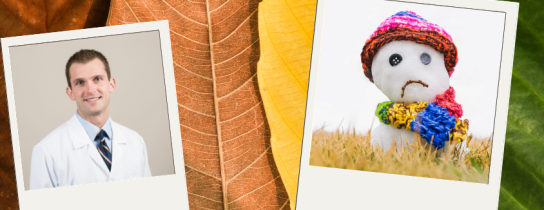
What is SAD?
In a normal year, 1 in 10 adults and children will experience mental health challenges serious enough to affect their work, family, or school life. The past two years have been far from ordinary, and this has impacted both those who were already struggling with their mental health and those who had never experienced mental health issues before. We interviewed Nicholas Batson, MD, Board Certified Adult, Child, and Adolescent Psychiatrist at Crystal Run Healthcare, to discuss how external factors can affect a person’s mental health.
Now that we’re approaching the winter season, can you explain what SAD is?
Nicholas Batson: SAD is the acronym for Seasonal Affective Disorder and is a form of depression related to seasonal change. Living further from the equator, where there are fewer daylight hours in the winter, increases the risk of developing SAD.
When can someone experience SAD?
NB: Symptoms of SAD typically start in late fall and early winter and last until the spring. Some people have a mild ‘blah’ feeling, while others can have depressive symptoms lasting months. January and February are the worst months for those with SAD because of the lack of daylight, which contributes to worsening symptoms.
What are some symptoms people should look out for if they are experiencing poor mental health?
NB: Common symptoms are fatigue, sleeping too much, and overeating. Other more severe daily symptoms are a loss of pleasure in previously enjoyed activities, difficulty concentrating, feelings of worthlessness, and even thoughts of suicide.
How do you maintain good mental health practices during this time?
NB: If there is anything good about SAD, it is that SAD is predictable. Prevention can go a long way to fight off SAD during the winter months. Maintaining a daily routine is helpful, particularly getting up when the alarm goes off. Sometimes I set two alarms because it is too easy to turn off the first one. Exercise is another valuable tool to combat the winter doldrums.
When should someone seek professional help?
NB: There is never a wrong time to seek help. The key is not to wait until symptoms impact your quality of life, even if only in a small way. Treatments are effective and there are several options a person can take to take care of their mental health.
At Crystal Run Healthcare, we take a multi-disciplinary, integrated approach to mental health and wellness. If you find yourself feeling sad, anxious, restless, hopeless or irritable, eating too much or too little, sleeping too much or too little, experiencing difficulty accomplishing normal tasks, or just not feeling like yourself, it may be time to make an appointment with your primary care provider at Crystal Run to discuss what your next steps may be.
Nicholas Batson, MD is a Psychiatrist Board Certified in Adult, Child & Adolescent Psychiatry. Dr. Batson earned his BA from the University of Louisville in Louisville, KY, and earned his Medical Degree from the American University of the Caribbean School of Medicine, Cupecoy St. Maarten. He completed his residency in Psychiatry at Wake Forest University Baptist Medical Center, Winston-Salem, NC, and completed his fellowship in Child and Adolescent Psychiatry at the University of Louisville in Louisville, KY. His clinical interests include Child Psychiatry, Adolescents Psychiatry, Adult Psychiatry, ADHD and Disruptive Behavioral Disorders, Mood Disorders, Family Therapy, Psychotic Disorders, and Developmental Disorders. Dr. Batson is currently seeing patients in Middletown.

 Optum Radiology at Crystal Run Healthcare
Optum Radiology at Crystal Run Healthcare Request medical records online
Request medical records online